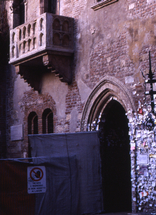Early Modern Circle 2007

Papers for 2007
19 February
Rosa Salzberg (Queen Mary College, London)
Ephemeral print and ephemeral printers in sixteenth-century Venice
Venue: Margaret Kiddle Room, 3rd floor, John Medley West.
Rosa is an MA graduate of the University of Melbourne and her paper is a chance for us to hear about her current PhD work at Queen Mary College, London. She writes:
I will talk about how my topic has evolved given the difficulties inherent in tracing and evaluating the trade in cheap printed literature at this time, given the great lack of surviving editions and supporting archival evidence. I am focusing on the interactions between the just-established printing trade in Venice and a more elusive, itinerant rank of ambulant sellers, performer-authors and publishers. These latter were people 'on the fringe' who left very little trace on the historical record, yet I believe they played a significant cultural role in bridging the worlds of oral and print culture, helping the new reams of vernacular printed matter being produced reach a broader audience, particularly towards the beginning of the period.
19 March
Jenny Spinks and Charles Zika
A discussion of opportunities for research, employment and community relations relating to early modern studies in Australia. Come along with your questions, ideas and experience for an informal professional development session.
16 April
New Postgraduate Research
Julie Davies
Science and the Occult in Seventeenth-Century England
My research will explore the relationship between developments in scientific theory, such as the advent of Cartesian mechanical philosophy, and debates about the validity of occult sciences, the nature of the supernatural world and the existence of witchcraft. For the purpose of this discussion I will be drawing on some of the writings of Meric Casuabon, who is most well known for his publication of John Dee's 'spiritual diaries' in 1659.
Helen Merritt
Local versus National Hierarchies during the Yorkshire Plot
In this talk about my PhD work on the Popish Plot, I will look at how the Yorkshire Plot was brought to trial in England in the 1670s and the influence of different jurisdictions on the progress of the court trials.
Michael Pickering
The Blood-Sucking Corpses of Augustin Calmet: Vampire Beliefs in Eighteenth-Century Europe
I am currently examining a 1759 publication by the French abbot and Benedictine monk, Dom Augustin Calmet. I am investigating how Calmet's work might be contextualised within the corpus of eighteenth-century English treatises of a similar (though generally non-vampiric) nature. My broader project is about vampire treatises and exhumations in the early eighteenth century.
21 May
Elizabeth Murray
'Changing minds by changing environment: Reformation in Shropshire', an aspect of her study of local responses to the Reformation in Shropshire, which she recently visited to collect material and visual evidence.
Richard Blandford
'Bishop Latimer and the Deprivation of Silvester Darius', a study of a fascinating case in Latimer's episcopal register for the 1530s which has previously been overlooked by historians.
18 June
Heather Dalton
Roger Barlow: Reconstructing the life of a sixteenth-century merchant
20 August
Grantley McDonald
Laurentius Corvinus as a Lutheran Apologist
17 September
Charlotte Smith
Gog and Magog: Reinterpreting early printed biblical images of the Turk
15 October
Leigh Penman
Crisis, Authority and the Kingdom of God: Paul Nagel (+1627) and the search for the 'Instrument of Kings'
Paul Nagel (+1627) was a practicing alchemist, astrologer and prophet of a soon to be dawning millennial kingdom. He personally knew Dee's assistant Edward Kelley, the mysterious Polish alchemist Michal Sendivogius and the Lusatian philosopher Jakob Boehme. As a young man he had studied theology and mathematics in Leipzig, but when disastrous social and personal conditions threatened the circumstances of his existence, his familiarity with various magical and heterodox works soon erupted into a heretical, revolutionary theosophy. The chief aim of this theosophy was to identify the so-called 'Royal Instrument' - a tool that was able to fix the measurements of the world and the universe and would allow him to 'traffick with Angels.' But the search would be a long and difficult one...
19 November
Claudia Guli
Blood Guilt and Providence as Justifications for the Trial of Charles I